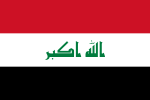Corruption is pervasive at all levels of government in Iraq. In 2021, President Barham Salih stated that US$150 billion of oil money had been stolen and smuggled out of Iraq in corrupt deals since the 2003 U.S. invasion.[1] Endemic corruption pervades Iraq's oil and gas sectors, which still accounts for more than 99 percent of the country’s exports and 85 percent of the government’s budget.[2] The Iraqi economy is predominantly a cash economy, making it almost impossible to trace the amount or the path the money follows.[3]
Transparency International's Corruption Perceptions Index scores 180 countries on a scale from 0 ("highly corrupt") to 100 ("very clean") and then ranks the countries by their score; the country ranked first is perceived to have the most honest public sector.[4] From 2013 to 2023, the Corruption Perceptions Index indicated that the Iraqi public sector was seriously corrupt but improving: Iraq's score remained constant or rose every year, rising from 16 to 23 over the eleven years. Its 2023 score of 23 ranked it 154th of 180 countries. For comparison with worldwide scores, the best 2023 score was 90 (ranked 1), the average score was 43, and the worst score was 11 (ranked 180).[5] For comparison with regional scores, the average score among Middle Eastern and North African countries [Note 1] was 34. The highest score among Middle Eastern and North African countries was 68 and the lowest score was 13.[6]
- ^ Tawfeeq, Mohammed (23 May 2021). "Iraq estimates that $150 billion of its oil money has been stolen from the country since the US-led invasion of 2003". CNN. Archived from the original on 2021-05-23. Retrieved 2021-05-23.
- ^ Watkins, Simon (11 April 2023). "TotalEnergies Pushes Ahead With Iraq Megadeal Despite Huge Risks". Oilprice.com.
- ^ "Iran's Trail Of Political And Economic Chaos: Part I – The Iraqi Experience". MEMRI. September 1, 2020.
- ^ "The ABCs of the CPI: How the Corruption Perceptions Index is calculated". Transparency.org. 20 December 2021. Retrieved 25 March 2024.
- ^ "Corruption Perceptions Index 2023: Iraq". Transparency.org. 30 January 2024. Retrieved 25 March 2024.
- ^ "CPI 2023 for Middle East & North Africa: Dysfunctional approach to fighting corruption undermines progress". Transparency.org. 30 January 2024. Retrieved 25 March 2024.
Cite error: There are <ref group=Note> tags on this page, but the references will not show without a {{reflist|group=Note}} template (see the help page).

